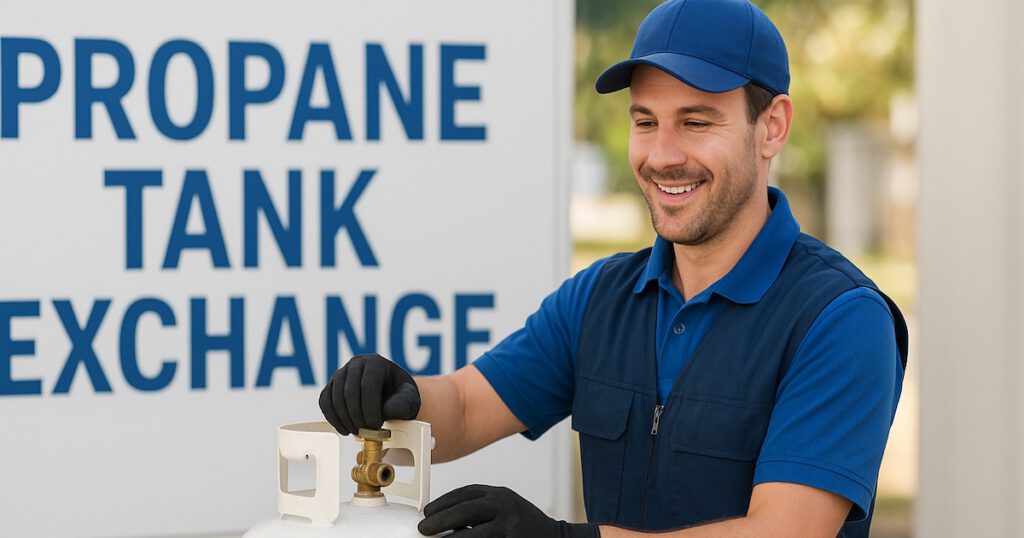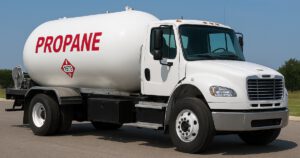
Propane tank exchange programs offer a convenient and often more affordable alternative to purchasing your own propane cylinders, making them an attractive option for homeowners, RVers, and small businesses across America.
Understanding how these programs work, their cost benefits, and when they’re the right choice can help you make informed decisions about your propane supply needs while potentially saving hundreds of dollars over traditional ownership models.
What Are Propane Tank Exchange Programs?
Propane tank exchange programs allow you to swap empty propane cylinders for full ones at designated exchange locations, eliminating the need to purchase and maintain your own tanks. This service model has revolutionized propane distribution, particularly for smaller users who don’t require large residential tanks.
How Exchange Programs Work
The exchange process is designed for maximum convenience and safety:
- Deposit system — You pay a deposit when renting your first cylinder (typically $20-$50)
- Swap and go — Return empty cylinders and receive full ones instantly
- Refill included — All exchanges include professionally filled cylinders
- Quality assurance — Every cylinder meets DOT and NFPA safety standards
This system works particularly well for RVers, seasonal residents, and homeowners who prefer not to invest in expensive propane infrastructure.
Types of Exchange Programs Available
Different programs cater to various user needs and propane consumption levels:
Retail Store Exchanges
Many hardware stores, propane dealers, and big-box retailers offer exchange services:
- Home Depot — Extensive network with competitive pricing
- Lowe’s — Building supply stores with propane exchange
- Local propane dealers — Independent operators with personalized service
- Farm bureaus — Agricultural cooperatives serving rural areas
Specialized RV and Camping Exchanges
RV-specific programs cater to mobile propane users:
- Camping World — RV dealerships with exchange services
- RV service centers — Mobile propane specialists
- State park facilities — Seasonal exchange locations
- Marine exchanges — Boat and marine propane services
Cost Comparison: Exchange vs. Purchase
Upfront Cost Savings
Exchange programs eliminate large upfront investments:
| Cost Category | Exchange Program | Purchase Option |
|---|---|---|
| Initial investment | $20-$50 deposit | $200-$500 per cylinder |
| Refill costs | $3.00-$5.00/gallon | $2.50-$4.00/gallon |
| Maintenance | Included in service | $50-$200 annually |
| Insurance | Covered by provider | $100-$300 annually |
Long-Term Cost Analysis
While exchange programs have higher per-gallon costs, they often provide better overall value:
- For occasional users — Exchange programs are typically more economical
- For frequent users — Purchasing may become cost-effective after 2-3 years
- For RVers — Exchange convenience often outweighs slight cost premium
- For seasonal users — No storage or maintenance costs during off-season
Major Propane Exchange Networks
AmeriGas Exchange Program
America’s largest propane provider offers extensive exchange options:
- National coverage — Over 2,000 locations across all 50 states
- Multiple cylinder sizes — 20 lb, 30 lb, and 40 lb cylinders available
- Online ordering — Reserve cylinders for pickup at specific locations
- Mobile app — Find nearest exchange locations and track cylinder status
Propane Depot Exchange Services
Specializes in both retail exchange and bulk commercial delivery:
- Regional coverage — Strong presence in Midwest and Southern states
- Bulk options — Exchange services for commercial and agricultural users
- Forklift cylinders — Industrial propane exchange programs
- Volume discounts — Better pricing for multiple cylinder exchanges
Local and Regional Networks
Many areas have strong local exchange programs:
- Cooperative exchanges — Community-owned facilities with competitive pricing
- Farm bureau programs — Agricultural cooperatives serving rural communities
- Municipal facilities — City or county-operated exchange centers
- Hardware store partnerships — Retail locations offering exchange services
Finding Exchange Locations Near You
Online Location Finders
Most major propane companies provide location finder tools:
Search Strategies
- “propane exchange near me” — Basic location searches
- “[City] propane exchange” — City-specific searches
- “RV propane exchange [State]” — RV-specific locations
- “bulk propane exchange” — Commercial exchange facilities
Company Websites
- AmeriGas locator — Interactive map with real-time availability
- Pinnacle Propane — Regional location finder with contact information
- Local cooperative sites — Community propane provider directories
- Google My Business — Local business listings with reviews
Safety and Quality Standards
Regulatory Compliance
All exchange programs must meet strict safety standards:
- DOT certification — Department of Transportation cylinder approval
- NFPA compliance — National Fire Protection Association standards
- Regular inspections — Annual cylinder testing and maintenance
- Leak testing — Every cylinder tested before exchange
Quality Assurance
Exchange programs maintain high standards for propane quality:
- Purity specifications — Minimum 95% propane content
- Pressure testing — All cylinders tested to 300 PSI
- Visual inspections — Exterior damage and valve condition checks
- Clean filling — Contamination-free filling procedures
Exchange Program Benefits and Drawbacks
Advantages of Exchange Programs
Exchange programs offer several compelling benefits:
✅ Cost-Effective for Small Users
- No large upfront investment required
- Pay only for propane you actually use
- No maintenance or storage costs
- Predictable monthly expenses
✅ Maximum Convenience
- Quick exchange process (usually 5-10 minutes)
- No waiting for deliveries or refills
- Available at convenient retail locations
- 24/7 access at many self-service locations
✅ Professional Quality Assurance
- All cylinders professionally inspected and filled
- Consistent quality and pressure
- Compliance with all safety regulations
- Peace of mind with certified equipment
Limitations to Consider
While convenient, exchange programs have some limitations:
❌ Higher Per-Gallon Costs
- Typically $0.50-$1.00 more per gallon than bulk
- Service fees added to base propane costs
- Deposit requirements for initial cylinder rental
- Not ideal for very high-volume users
❌ Limited to Specific Locations
- Requires travel to exchange facilities
- Not available in all rural areas
- Dependent on business hours for staffed locations
- Less convenient than home delivery
When to Choose Exchange vs. Purchase
Best for Exchange Programs
- RV and camping enthusiasts — Perfect for mobile propane needs
- Seasonal residents — No storage issues during off-season
- Small households — Low to moderate propane consumption
- Temporary situations — Construction sites or special events
Best for Purchasing Tanks
- High-volume users — More than 200 gallons per month
- Permanent installations — Whole-house heating systems
- Rural properties — Limited access to exchange locations
- Long-term planning — Expecting to use propane for 5+ years
Getting Started with Propane Exchange
Choosing Your First Cylinder
Select the right cylinder size for your needs:
- 20 lb cylinders — Grills, lanterns, small heaters ($20-$30)
- 30 lb cylinders — Larger grills, portable heaters ($25-$40)
- 40 lb cylinders — Commercial applications, multiple appliances ($35-$50)
- 100 lb cylinders — Industrial uses, high-volume needs ($60-$80)
Finding Exchange Locations
Locate exchange facilities in your area:
- Search online — Use company websites or “propane exchange near me”
- Call ahead — Confirm availability and cylinder sizes
- Check reviews — Read customer feedback on service quality
- Visit in person — Assess facility cleanliness and staff knowledge
Understanding the Process
What to expect during your first exchange:
- Provide identification — Driver’s license for initial cylinder rental
- Pay deposit — Refundable deposit for cylinder rental
- Receive full cylinder — Pre-filled and ready to use
- Get usage instructions — Safety and handling guidelines
Common Exchange Program Questions
Deposit and Refund Policies
Understanding deposit requirements and refunds:
- Deposit amounts — Typically $20-$50 per cylinder
- Refund process — Full refund when cylinder is returned
- Cleaning fees — Possible fees for damaged or heavily soiled cylinders
- Transfer policies — Deposits usually non-transferable between companies
Seasonal Availability
Exchange availability during peak seasons:
- Summer grilling season — High demand for 20 lb cylinders
- Winter heating — Increased need for larger cylinders
- Holiday periods — Popular for outdoor cooking and emergency preparedness
- Emergency situations — Priority service during outages or disasters
Cylinder Maintenance and Inspection
How exchange programs handle cylinder care:
- Regular inspections — Annual testing and certification
- Valve replacement — As needed during inspection cycles
- Cleaning procedures — Professional cleaning before refilling
- Replacement policy — Free replacement for defective cylinders
Environmental and Safety Benefits
Environmental Impact
Exchange programs promote sustainability:
- Reduced waste — Reusable cylinders instead of disposable options
- Recycling programs — Proper disposal of old or damaged cylinders
- Efficient distribution — Minimized transportation through centralized refilling
- Leak prevention — Professional handling reduces accidental releases
Safety Advantages
Professional exchange services enhance safety:
- Certified cylinders — All equipment meets safety standards
- Trained personnel — Knowledgeable staff for safe handling
- Quality control — Consistent filling and inspection procedures
- Emergency preparedness — Proper procedures for leak detection and response
Future of Propane Exchange Programs
Technological Advancements
Innovations improving exchange services:
- Mobile apps — Real-time location finding and reservation systems
- Automated kiosks — 24/7 self-service exchange stations
- Smart cylinders — Digital monitoring of cylinder status and usage
- Delivery integration — Hybrid models combining exchange with delivery
Expanding Coverage
Growth in exchange program availability:
- Rural expansion — More facilities in underserved areas
- Commercial growth — Larger cylinder options for businesses
- Partnership development — More retail and hardware store locations
- International expansion — Growing availability in Canada and Mexico
Making Your Decision
Propane tank exchange programs offer an excellent balance of convenience, cost savings, and professional service for many users. Whether you’re a weekend camper, seasonal resident, or small business owner, these programs provide reliable access to propane without the hassles and costs of ownership.
Consider your usage patterns, location, and budget when deciding between exchange programs and traditional tank ownership. For most occasional to moderate users, exchange programs provide the best combination of value and convenience in today’s propane market.
Ready to explore propane exchange options? Contact local propane providers to learn about available programs and find the exchange locations nearest you.
Additional Resources
For more information about propane exchange programs:
- National Propane Gas Association — Industry standards and safety information
- Recreational Vehicle Industry Association — RV-specific propane guidelines
- Local propane cooperatives — Community-based exchange programs
- State energy offices — Regional propane program information
Remember to always prioritize safety when handling propane, and consult with licensed professionals for installation or complex applications.
About Jennifer Whitaker
Propane industry expert and content contributor for MyPropane.com.
View all posts by Jennifer Whitaker →Related Articles

Complete Guide to Propane Delivery Services in the USA
Sep 16, 2025 • 5 min read
Discover everything about propane delivery services: scheduled delivery, will-call options, pricing, and how to choose the right propane provider for…

Propane Refill Near Me: Complete Directory
Sep 17, 2025 • 7 min read
Find propane refill stations and exchange centers near you. Learn about self-service refill options, exchange programs, and how to locate…